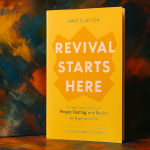 Here’s what my Bible records Peter explaining on the Day of Pentecost: ‘In the last days, God says, I will pour out my Spirit on all people. Your sons and daughters will prophesy, your young men will see visions, your old men will dream dreams. Even on my servants, both men and women, I will pour out my Spirit in those days, and they will prophesy.
Here’s what my Bible records Peter explaining on the Day of Pentecost: ‘In the last days, God says, I will pour out my Spirit on all people. Your sons and daughters will prophesy, your young men will see visions, your old men will dream dreams. Even on my servants, both men and women, I will pour out my Spirit in those days, and they will prophesy.
The NIV11 does show the cognate terms clearly because “servants” refers to male and female servants of God — same term, different gender. What this text says is that Pentecost heralded a new day, and that day meant God’s Spirit would be poured out on all — men and women, sons and daughters, young and old. This is Joel’s and Peter’s version of Paul’s Galatians 3:28. But instead of the “in Christ” theme of Paul we’ve got the “gifts” theme. God chooses to whom to distribute gifts; God chooses from the Day of Pentecost on to give those gifts to men and women.
If God gifts women with prophecy, why are so few women speaking in churches?
But there are plenty of churches that don’t recognize the gifts of women when they’ve got them. Non-recognition of gifts grieves the Spirit. We don’t decide in advance which gender speaks and which gender is designed to listen; we listen instead to the gifting of God. When God gifts, we receive.
Many women have a story about believing and knowing they’ve been called and gifted by God; some of them have been given sufficient opportunity — small groups, youth groups, sudden opportunities (I tell the story of Alice in Junia is Not Alone) — to notch it up from knowing they are gifted to being recognized by others for those gifts. Then church leaders — males — step up to say God doesn’t gift women like that. And that flies in the face of Acts 2 which says God gives women the highest gift of all — to prophesy.
A prophet is someone who stands between God and God’s people: God speaks, the prophet hears, and the prophet speaks for God to the people. It is a noble calling; if not the highest of gifts, near the top.
A very good memoir of a woman called is by Sara Gaston Barton, A Woman Called: Piecing Together the Ministry Puzzle. I would urge you to get a copy of this book and get ready either to read it or better yet: get a copy, read it and then give it someone who is called and waiting for the church to recognize God’s calling. Sara tells her story among the Churches of Christ, of a gift not always recognized … and so her struggle is the struggle of many called women.
I like this book so much I wrote the foreword. But there is no way to blog through a memoir. They’re meant to be read, not sketched. It’s a great story of a life. If you are looking to wrangle with a woman over some passages in the NT, go elsewhere. This not that kind of book; it’s her story being called and discerning what that means when males are casting hot shadows over any woman who thinks such thoughts. The book is full of grace.
What we need more of is males. Males who believe women are gifted by God. Males who are willing to resist churches and leaders who think women aren’t gifted. Women can stand up and fight but time has convinced me that until recognized male leaders have the courage to stand up for called and gifted women their gifts won’t be recognized. So here’s my challenge: If you think the word omitted in the title to this post is Daughters, then I’m asking men who really believe it to look around at your church and ask one question: Do women speak routinely in my church or is always males, or almost always males? If it is mostly males, it is time for you to stand up for the called women at your church. (My logic is from the greater to the lesser: if women can be prophets, they can surely speak behind a pulpit on Sunday morning. Teachers are third and prophets second in 1 Cor 12:28.)















